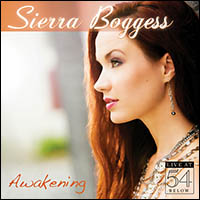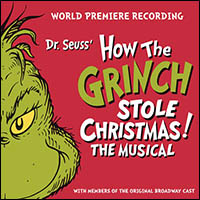*
| |
 |
|
| cover art | ||
Sierra Boggess — best known locally for her stint as The Little Mermaid on wheels, or more specifically on Heelys — stormed into 54 Below last August and proved to be both entertaining and surprising. Her act, which bore the New Age title Awakening — she is the child of ex-hippies, she tells us — was recorded live and has now been released by Broadway Records.
Boggess starts out in Julie Andrews mode, singing "I Have Confidence" from The Sound of Music, followed by "Lovely" from A Funny Thing Happened on the Way to the Forum. Confessing her love for La Boheme, she follows these with a couple of selections mixing the roles of Mimi and Musetta.
Being very much a family person, Boggess' sister Summer is on cello, and she then introduces her 60-year old father, who accompanies her on "Wildflowers" playing a guitar handmade by himself. Boggess then turns, inevitably, to The Little Mermaid and her reactions to her big Broadway break. (She also discusses her subsequent big break as the star of Rebecca, which never made it out of rehearsals. Boggess also appeared in Andrew Lloyd Webber's Love Never Dies, which never made it to New York; and was slated for Hal Prince's Prince of Broadway, which has yet to make it onstage.) Prince, Lloyd Webber and choreographer Gillian Lynne are discussed in a section about inspiration. (Boggess tells us that it was Lynne who instructed her — while preparing the Las Vegas production of The Phantom of the Opera — to "keep your nipples flying.") This leads to a droll Lloyd Webber medley, with the big hits sung in both pop and operatic styles and revealing Boggess as a very funny singing actress.
She is sentimental, too, in a segment that praises her grandparents with "Smoke Gets In Your Eyes." She also turns passionate while describing her idolization of Barbra Streisand and her opportunity to actually meet the star. Brian Hertz plays the piano and serves as musical director, and the 70 minutes flies by on this delightful CD.
*
| |
 |
|
| cover art | ||
Back in the mid-1990s — a time when Broadway typically had multiple theatres sitting empty through the winter, awaiting spring openings — producers began toying with the notion of producing seasonal fare for the holidays that would appeal to all those audiences who flocked to see the Radio City Music Hall Christmas Show. There had already been a successful Broadway-style seasonal show, the Alan Menken/Lynn Ahrens A Christmas Carol from director Mike Ockrent and choreographer Susan Stroman. But that didn't actually play Broadway; it was produced at what was then the Paramount — and is now the Theatre at Madison Square Garden — for ten Decembers, starting in 1994.
The idea of mounting a new seasonal musical on Broadway came to fruition with Dr. Suess' How the Grinch Stole Christmas! which opened in November 2006 at what was then called the Hilton (and is presently the Foxwoods). The show seemed to do adequate business; it's impossible to tell, as high grosses don't necessarily mean that a show is turning a profit. (Remember Spider-Man Turn Off the Dark?) The Grinch returned the following November to the St. James, where it ran head on into a stagehand strike and permanently called it quits after New Year's.
This formula was tried once again, somewhat more successfully, with a stage version of Irving Berlin's White Christmas. This was a better musical than The Grinch and presumably more successful, but basically a rewarmed version of a subpar motion picture. White Christmas had a significantly better business plan than The Grinch, with additional companies touring for the Thanksgiving/Christmas period. The show made it through two editions at the Marquis, in 2008 and 2009, and has quickly worked its way into a stock & amateur perennial, which was the idea in the first place.
Next came Elf, based on the film comedy of the same title. This was significantly better than the earlier holiday musicals and altogether cheerful, thanks in part to an entertaining score from Matthew Sklar and Chad Beguelin plus canny staging by a pre-The Book of Mormon Casey Nicholaw. Elf played the holiday season of 2010 at the Hirschfeld, couldn't find a home in 2011, and returned to 45th Street in 2012. The best of these seasonal shows thus far, by far, is A Christmas Story, The Musical. (I don't consider this to be merely a good holiday musical — it is a first-rate Broadway musical, holiday or otherwise.) With a skillfully delectable score by Benj Pasek and Justin Paul, A Christmas Story played the Lunt in 2012 and the Theatre at Madison Square Garden in 2013, and one hopes it will continue to reappear for the enjoyment of children and adults alike. The show already had a long history prior to Broadway: After starting in 2009 in Kansas City, it was remounted for holiday tours in 2010 (with Pasek & Paul replacing the original songwriter) and 2011 (with John Rando replacing the original director).
What makes this discussion relevant is the surprising appearance — six years after its premiere — of a new, professionally-produced CD of Dr. Suess' How the Grinch Stole Christmas! Four of the original cast leads were brought into the studio last August, along with a full cast and a good portion of the pit band (which has been significantly augmented for the occasion). We are always glad to have cast recordings come along, but one has to wonder: Why?
The Grinch in 2006 was exceedingly mild. It introduced a grandly villainous leading man in Patrick Page. (Page had been on Broadway before, but without attracting much notice.) The show also offered a chance to see the always engaging John Cullum, here playing a talking dog.
Dr. Seuss wrote his children's classic of the same title back in 1957, directly following "The Cat in the Hat." The book was made into a 27-minute animated television special in 1966, which due to annual holiday showings, became something of a small screen classic. A stage version — with a new score by Mel Marvin and Timothy Mason supplementing two songs from the TV special — premiered at the Children's Theatre of Milwaukee in 1995. Jack O'Brien, then artistic director of the Old Globe Theatre in San Diego, staged the show for the holidays in 1998. It instantly became one of the Old Globe's biggest hits, with repeat visits.
The outsized San Diego success convinced producers to bring the show to Broadway in 2007. O'Brien, who in the interim had directed Hairspray and other major hits, was at this point directing Tom Stoppard's three-part The Coast of Utopia and therefore unavailable. Thus, the show was entrusted to an assistant — and I would suggest that a major cause of the lack of magic in the Broadway Grinch was O'Brien's absence.
The CD serves as a reminder of the show's failings. There is a big difference between exuberant family entertainment (like Annie, Oliver! or A Christmas Story) and unengaging children's theatre. The Grinch falls in the latter category; while Seuss's original book is delightfully subversive, the musical falls flat.
The cast album starts out bright and snappy, thanks to Michael Starobin's overture. In fact, the orchestrations and the dance arrangements (by David Krane) continually perk things up, but there is little that can be done with the nursery school-like songs. (The lyrics, be they by Mason or originals from the Seuss tome, are of the "nifties"/"gifties" and "singing"/"tingalinging" variety.)
The one bright spot, musically, is the sinisterly slippery "You're a Mean One, Mr. Grinch," one of the two surviving songs from the TV special. This comes from composer Albert Hague (of Plain and Fancy and Redhead) and lyricist Seuss, and it is a little jewel. But there is not much that Page, Cullum and the others can do with the rest of the score, which leads one to wonder why anyone thought to put such time, effort and money to record this show six years after the Broadway opening. (Steven Suskin is author of "Show Tunes," "The Sound of Broadway Music: A Book of Orchestrators and Orchestrations," "Second Act Trouble," the "Opening Night on Broadway" book and "The Book of Mormon: The Testament of a Broadway Musical." He also writes the Aisle View blog at The Huffington Post. He can be reached at [email protected].)










